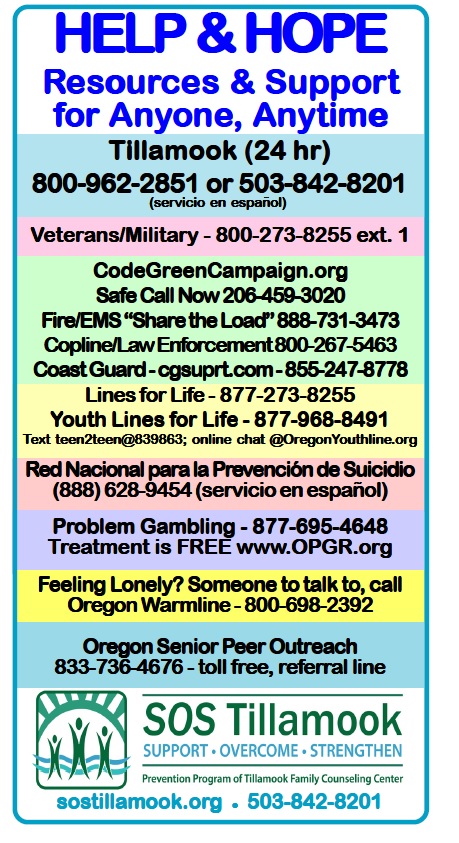As we send this message, we know many of you are dealing with being evacuated from your homes or have friends and loved ones who have been evacuated. Many who have been evacuated don’t have homes to return to. The wildfires, on top of the COVID-19 public health crisis, increase the stress and anxiety we’re facing. We’re thinking of you, and our hearts go out to everyone who is experiencing loss and struggling to get through this time. We will continue to share resources from OHA and other agencies to support your health and safety. If there’s anything you’d like us to share, please feel free to reach out to us. We always appreciate feedback from our readers.
This is an incredibly challenging time for many reasons. It’s also important to know that if you need emotional support, help is available for you.
- SAMHSA’s Disaster Distress Helpline provides 24/7, 365-day-a-year crisis counseling and support to people experiencing emotional distress related to natural or human-caused disasters. Call SAMHSA’s Disaster Distress Helpline at 1-800-985-5990 or text TalkWithUs to 66746 to speak to a trained crisis counselor.
- If you are experiencing a crisis, in an emergency, call 911. Help is also available from Lines for Life, a suicide prevention organization with specific resources for youth, military personnel and their families, and those affected by substance abuse problems. Visit linesforlife.org or call one of their helplines:
- Suicide Lifeline: 1-800-273-8255, 1-888-628-9454 for Spanish
- Alcohol and Drug Helpline: 1-800-923-4357
- Military Helpline: 1-888-457-4838
- Youthline: 1-877-968-8491 or text teen2teen to 839863
- OHA also has contacts for crisis services by county on its website.

Wildfire evacuation protocol for people quarantining or isolating due to COVID-19
During Oregon’s wildfires and safety evacuations, it is important to take precautions to avoid spreading COVID-19, particularly for those in isolation or quarantine due to a positive diagnosis or exposure to the virus.
The first priority in wildfire situations is responding to the evacuation and safety instructions of local and state fire officials – and heeding their warnings. Regardless of disease status, if you are asked or ordered to evacuate, you should do so.
If you or a household member are quarantining or isolating to prevent the spread of COVID-19, please take the following precautions:
- If ordered to evacuate, do so immediately. Follow all instructions from fire officials.
- If you have time, reach out to your local public health authority, who should have already been in contact with you about your isolation/quarantine. They may have solutions to help you continue to isolate/quarantine if you are evacuated.
- Should you be directed to a shelter or other evacuation space, please let officials know you are in isolation/quarantine so that they can take steps to keep you distanced from other evacuees.
- Wear a mask at all times when outside your home, or if you may come into contact with people who do not live with you.
- If you are an older adult or a person with disabilities, reach out to the Aging and Disabilities Resource Connection for information about resources 1-855-ORE-ADRC(1-855-673-2372).
- Practice physical distancing to the greatest extent possible, if you must travel outside your home for any reason, including evacuation.
- More information about wildfire safety and your health is available on healthoregon.org/wildfires.
- Additional resources can be found by calling 2-1-1.
- Find statewide Oregon Wildfire Resources at wildfire.oregon.gov/
How to help children cope during a disaster
The amount of damage caused by a disaster can feel overwhelming to children and adults. Even the threat of evacuation can increase children’s stress and anxiety.
We know these conversations can be hard. The CDC offers the following tips to help reduce stress before, during, and after a disaster or traumatic event.
Before
- Talk to your children so that they know you are prepared to keep them safe.
- Review safety plans before a disaster or emergency happens. Having a plan will increase your children’s confidence and help give them a sense of control.
During
- Stay calm and reassure your children.
- Talk to children about what is happening in a way that they can understand. Keep it simple and appropriate for each child’s age.
After
- Provide children with opportunities to talk about what they went through or what they think about it. Encourage them to share concerns and ask questions.
- You can help your children feel a sense of control and manage their feelings by encouraging them to take action directly related to the disaster. For example, children can help others after a disaster, including volunteering to help community or family members in a safe environment. Children should NOT participate in disaster cleanup activities for health and safety reasons.
- It is difficult to predict how some children will respond to disasters and traumatic events. Because parents, teachers, and other adults see children in different situations, it is important for them to work together to share information about how each child is coping after a traumatic event.
Learn more about how to help children cope from the CDC.
COVID cases continue to drop
OHA released its weekly report today, and during the week from Monday, Aug. 31, through Sunday, Sept. 6, OHA recorded 1,477 new cases of COVID-19 infection. It’s down 5 percent from the previous week and more than 30 percent since the pandemic’s peak in mid-July.
This marks the fifth consecutive weekly decline. Deaths also declined sharply during that week from 39 to 23. The percentage of positive tests also dropped from 4.4 to 4.3 percent.
The age group with the highest incidence of reported infection continues to be people between 20 and 29 years old. Hospitalizations are highest in the older age groups and nearly half of all deaths were people 80 or older.
Oregon reports 187 new confirmed and presumptive COVID-19 cases, 3 new deaths
COVID-19 has claimed three more lives in Oregon, raising the state’s death toll to 497, the Oregon Health Authority reported Thursday September 10th.
OHA also reported 187 new confirmed and presumptive cases of COVID-19 Thursday September 10th, bringing the state total to 28,654.
The new confirmed and presumptive COVID-19 cases reported are in the following counties: Benton (4), Clackamas (12), Clatsop (3), Columbia (1), Coos (3), Deschutes (2), Hood River (1), Jackson (8), Jefferson (3), Josephine (1), Klamath (2), Lane (5), Lincoln (1), Linn (6), Malheur (16), Marion (35), Morrow (1), Multnomah (33), Polk (4), Umatilla (6), Union (3), Wasco (1), Washington (27) and Yamhill (9).
For more information, go to https://govstatus.egov.com/OR-OHA-COVID-19



